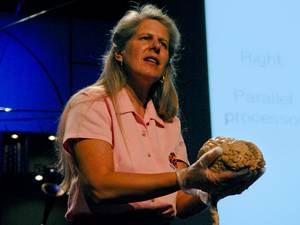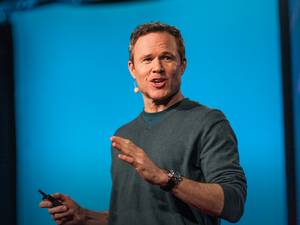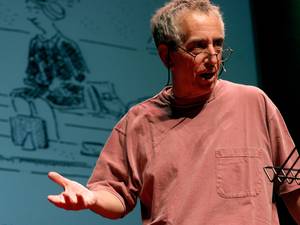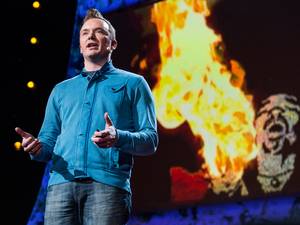Ted Talks: 10 talks you won’t be able to stop thinking about
Playlist (10 talks): 10 talks you won’t be able to stop thinking about
-
 18:19
Jill Bolte Taylor got a research opportunity few brain scientists would wish for: She had a massive stroke, and watched as her brain functions — motion, speech, self-awareness — shut down one by one. An astonishing story.
18:19
Jill Bolte Taylor got a research opportunity few brain scientists would wish for: She had a massive stroke, and watched as her brain functions — motion, speech, self-awareness — shut down one by one. An astonishing story. -
 20:27
Writer Andrew Solomon has spent his career telling stories of the hardships of others. Now he turns inward, bringing us into a childhood of adversity, while also spinning tales of the courageous people he’s met in the years since. In a moving, heartfelt and at times downright funny talk, Solomon gives a powerful call to action to forge meaning from our biggest struggles.
20:27
Writer Andrew Solomon has spent his career telling stories of the hardships of others. Now he turns inward, bringing us into a childhood of adversity, while also spinning tales of the courageous people he’s met in the years since. In a moving, heartfelt and at times downright funny talk, Solomon gives a powerful call to action to forge meaning from our biggest struggles. -
 15:24
Here’s a TED first: an animated Socratic dialog! In a time when irrationality seems to rule both politics and culture, has reasoned thinking finally lost its power? Watch as psychologist Steven Pinker is gradually, brilliantly persuaded by philosopher Rebecca Newberger Goldstein that reason is actually the key driver of human moral progress, even if its effect sometimes takes generations to unfold. The dialog was recorded live at TED, and animated, in incredible, often hilarious, detail by Cognitive.
15:24
Here’s a TED first: an animated Socratic dialog! In a time when irrationality seems to rule both politics and culture, has reasoned thinking finally lost its power? Watch as psychologist Steven Pinker is gradually, brilliantly persuaded by philosopher Rebecca Newberger Goldstein that reason is actually the key driver of human moral progress, even if its effect sometimes takes generations to unfold. The dialog was recorded live at TED, and animated, in incredible, often hilarious, detail by Cognitive. -
 16:52
What happens when two monkeys are paid unequally? Fairness, reciprocity, empathy, cooperation — caring about the well-being of others seems like a very human trait. But Frans de Waal shares some surprising videos of behavioral tests, on primates and other mammals, that show how many of these moral traits all of us share.
16:52
What happens when two monkeys are paid unequally? Fairness, reciprocity, empathy, cooperation — caring about the well-being of others seems like a very human trait. But Frans de Waal shares some surprising videos of behavioral tests, on primates and other mammals, that show how many of these moral traits all of us share. -
 14:28
Stress. It makes your heart pound, your breathing quicken and your forehead sweat. But while stress has been made into a public health enemy, new research suggests that stress may only be bad for you if you believe that to be the case. Psychologist Kelly McGonigal urges us to see stress as a positive, and introduces us to an unsung mechanism for stress reduction: reaching out to others.
14:28
Stress. It makes your heart pound, your breathing quicken and your forehead sweat. But while stress has been made into a public health enemy, new research suggests that stress may only be bad for you if you believe that to be the case. Psychologist Kelly McGonigal urges us to see stress as a positive, and introduces us to an unsung mechanism for stress reduction: reaching out to others. -
 14:04
Beware: Rives has a contagious obsession with 4 a.m. At TED2007, the poet shared what was then a minor fixation with a time that kept popping up everywhere. After the talk, emails starting pouring in with an avalanche of hilarious references—from the cover of “Crochet Today!” magazine to the opening scene of “The Metamorphosis.” A lyrical peek into his Museum of Four in the Morning, which overflows with treasures.
14:04
Beware: Rives has a contagious obsession with 4 a.m. At TED2007, the poet shared what was then a minor fixation with a time that kept popping up everywhere. After the talk, emails starting pouring in with an avalanche of hilarious references—from the cover of “Crochet Today!” magazine to the opening scene of “The Metamorphosis.” A lyrical peek into his Museum of Four in the Morning, which overflows with treasures. -
 19:37
Psychologist Barry Schwartz takes aim at a central tenet of western societies: freedom of choice. In Schwartz’s estimation, choice has made us not freer but more paralyzed, not happier but more dissatisfied.
19:37
Psychologist Barry Schwartz takes aim at a central tenet of western societies: freedom of choice. In Schwartz’s estimation, choice has made us not freer but more paralyzed, not happier but more dissatisfied. -
 15:21
Jason Fried has a radical theory of working: that the office isn’t a good place to do it. In his talk, he lays out the main problems (call them the M&Ms) and offers three suggestions to make work work. (Filmed at TEDxMidWest.)
15:21
Jason Fried has a radical theory of working: that the office isn’t a good place to do it. In his talk, he lays out the main problems (call them the M&Ms) and offers three suggestions to make work work. (Filmed at TEDxMidWest.) -
 5:01
Within each of us are two selves, suggests David Brooks in this meditative short talk: the self who craves success, who builds a résumé, and the self who seeks connection, community, love — the values that make for a great eulogy. (Joseph Soloveitchik has called these selves “Adam I” and “Adam II.”) Brooks asks: Can we balance these two selves?
5:01
Within each of us are two selves, suggests David Brooks in this meditative short talk: the self who craves success, who builds a résumé, and the self who seeks connection, community, love — the values that make for a great eulogy. (Joseph Soloveitchik has called these selves “Adam I” and “Adam II.”) Brooks asks: Can we balance these two selves? -
 10:01
In art school, Phil Hansen developed an unruly tremor in his hand that kept him from creating the pointillist drawings he loved. Hansen was devastated, floating without a sense of purpose. Until a neurologist made a simple suggestion: embrace this limitation … and transcend it.
10:01
In art school, Phil Hansen developed an unruly tremor in his hand that kept him from creating the pointillist drawings he loved. Hansen was devastated, floating without a sense of purpose. Until a neurologist made a simple suggestion: embrace this limitation … and transcend it.

